
Steamboats - Live Theatre
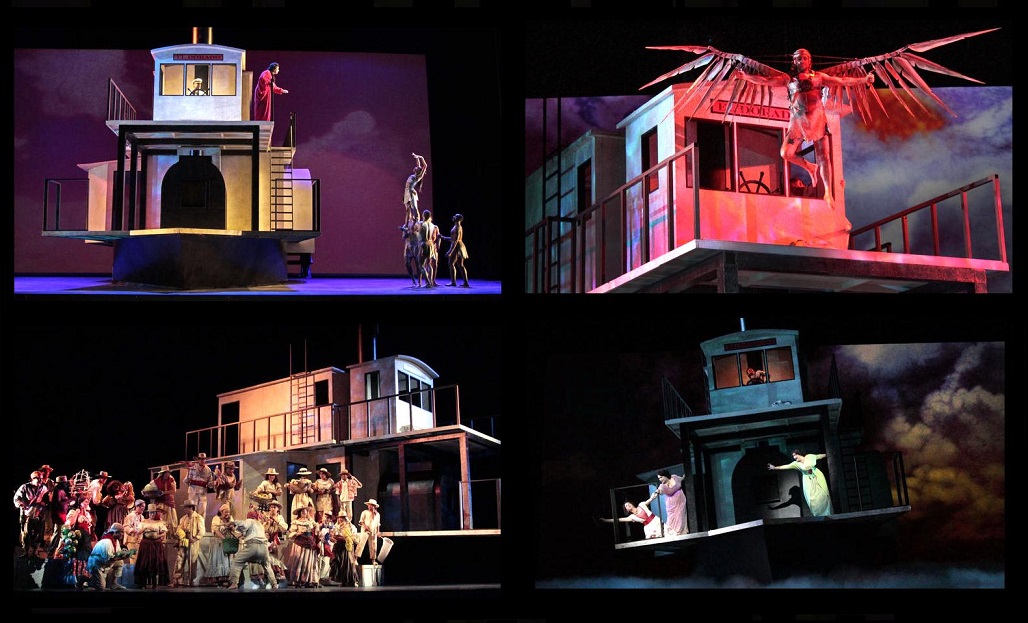
OPERATIC ADAPTATION OF "LOVE IN THE TIME OF CHOLERA" BY GABRIEL GARCIA MARQUEZ THAT WE HAVE FRAMES FROM THE MOTION PICTURE VERSION IN STEAMBOATS IN THE MOVIE. STYLIZED SET OF THE STEAMBOAT IS SEEN IN THE 4 PHOTOS FROM TODAY'S L.A. TIMES.
LINK TO VIDEO BELOW SHOWS THE BOAT SET ON A TURNTABLE WITH SEVERAL SCENES OF SINGERS BELTING OUT ARIAS.
youtube.com
Washington National Opera presents: Florencia in the Amazon
Published on Sep 21, 2014
kennedy-center.org
DANIEL CATÁN
FLORENCIA IN THE AMAZON
Review
'Florencia en el Amazonas' a culture clash solved by orchestra
OperaEntertainmentCultureReviews
latimes.com
Mark Swed
LOS ANGELES TIMES
Mark Swed
Opera is not standing still. It's growing, uncontrollably, by leaps and messy bounds latimes.com
Novelist Gabriel García Márquez's magic realism inspired the story; Puccini inspired the vocal lines As the first opera by a Mexican composer and, astonishingly, the first Spanish-language opera commissioned by a major U.S. opera company, Daniel Catán's "Florencia en el Amazonas" had by its very nature all the makings of becoming an operatic game-changer when it was first performed in Houston in 1996. Texans loved it. Angelenos loved it when it reached Los Angeles Opera the following year.
Catán, who lived in L.A. and died in 2011, became a beloved local composer and an international figure. At last, we had a new Spanish-language opera for a host of excellent native Spanish-speaking singers on the international circuit.
And finally, after 17 years, L.A. Opera returned "Florencia" to the Dorothy Chandler Pavilion on Saturday night in a modified version of Francesca Zambello's original production. The game has by now long been changed. But as this revival makes curiously clear, not quite as we might have first imagined.
What struck the first-night audience as new in "Florencia" was not its Latin roots, essential though they were to Catán's source and musical style. The inspiration for this story—of passengers on a ship traveling on the Amazon in the early 1900s to hear the return of a native opera star but discovering something else entirely—was the magic realism of Colombian novelist Gabriel García Márquez.
The inspiration for the gorgeous pigmentation of Catán's atmospheric orchestral writing, the most original part of the score, was the Amazon itself, the magical sounds and sensations of the jungle. But the inspiration for the vocal lines was Puccini. That was a shock from a composer who had a background in North and Latin American as well as European, Modernism.
There is inevitably in "Florencia" a titillating tension between the sophisticated Latin instrumental writing and anachronistic Italianate singing. But it was hard to hear that at first. At the opera's premiere, for instance, a distinguished European opera critic who was part of a large international press contingent that had traveled to Houston to hear what had been promoted as the most newsworthy new opera of the year, was in dismay; he complained that he could not possibly find a way to justify to his editors the expense of reporting on warmed-over verismo opera. No one in Germany would care, he insisted.
Americans did care. And Catán's overt neo-Romanticism wound up as the main reason "Florencia" caught on (even in Europe) and helped generate a new genre of populist opera.
It is a little easier, although still somewhat problematic, to come to terms with Catán's old and new in the L.A. Opera revival. Part of what made it easier was the outstanding conducting of Grant Gershon, who unraveled new layers of wonder in Catán's orchestration. The pit, more than stage, is where most of the magical realism is realized.
Marcela Fuentes-Berain's Márquez-manqué libretto populates the ship with characters who find love in the time of cholera. For two couples and the opera star, Florencia, the Amazon becomes a river of psychopharmacological properties, a drug that opens their various emotional blockages.
Florencia, who travels incognito, seeks fulfillment in a lost love of a butterfly hunter. The blockage of the young lovers, Rosalba and Arcadio, is their disdain for love. The blockage of middle-age lovers Paula and álvaro is their familiarity. The Prospero-like Ríolobo, who serves as narrator, is the spirit of the river, able to command its mystical powers.
The Amazon has its work cut out for it, and Catán compensates for the libretto's clumsy obviousness with shifting rhythms in the orchestra, where the rhythms are neither obvious nor clumsy. Lush, lurid climaxes are plentiful, but a brass undercurrent, with special credit to devious trombone glissandi, offers the aural impression of sand shifting underfoot.
New to Zambello's unfussy production, which takes place on a minimalist ship designed by Robert Israel, are painterly Amazonian projections by S. Katy Tucker that add a nice touch. Eric Sean Fogel's tasteful new choreography for five dancers symbolizes the river's strange nature more effectively than does Ríolobo, a fairly wan character.
"Florencia" requires a parade of Puccinians, and L.A. Opera features five singers who are native Spanish speakers. Unfortunately, Chilean soprano Verónica Villarroel—a regular with the company in the 1990s who hasn't performed in an opera here for a decade—comes vocally too late to the title role. But mezzo-soprano Nancy Fabiola Herrera provides a robust Paula, and soprano Lisette Oropesa, a brilliantly perky Rosalba.
Arturo Chacón-Cruz's sweet and lithe tenor may be a shade too light for Arcadio, but he is an appealing presence onstage. Baritone José Carbó adds athletic grace to Ríolobo; Gordon Hawkins is an álvaro with an edge; David Pittsinger, an affable ship's captain.
All find their love and are transformed by it, but they are little more than the river's Puccinian pawns. Thanks to the L.A. Opera orchestra, at least, this ol' man Amazon really rolls along.
Mark Swed
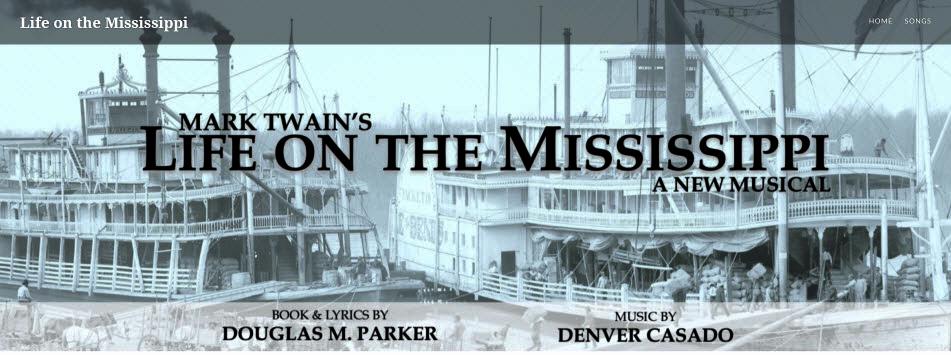
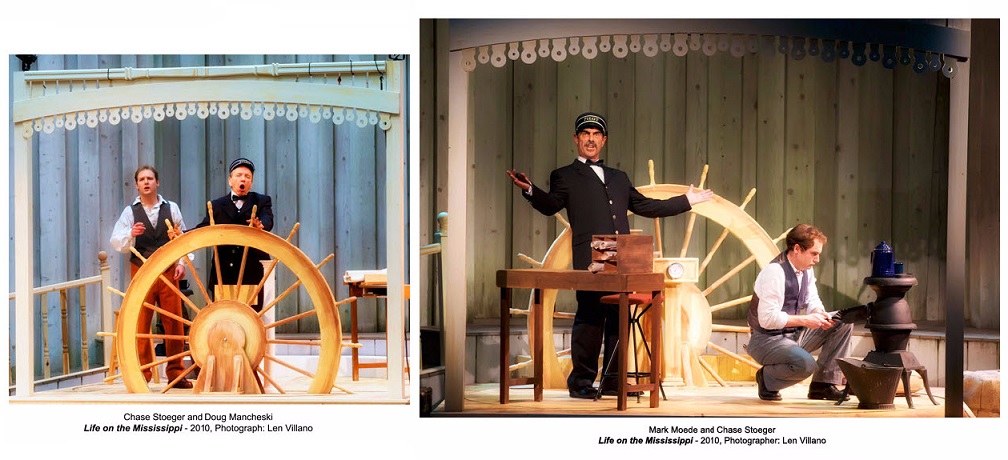
Review
Twain musical flows along jsonline.com 'Life on the Mississippi' at Door County's American Folklore Theatre at Peninsula State Park
By Mike Fischer
July 23, 2010
Special to the Journal Sentinel
Milwaukee, Wisconsin
Fish Creek—Mark Twain borrowed more from and gave more to American folklore than any of our canonical writers.
It's therefore no surprise to see Door County's American Folklore Theatre celebrate its 20th birthday - and commemorate the 100th anniversary of Twain's death - by giving birth to "Life on the Mississippi," an original musical commemorating the two-year period when a young Samuel Clemens became a steamboat pilot on Old Man River.
Drawing heavily on Twain's own memoirs, Douglas M. Parker (book and lyrics) and Denver Casado (music) focus on Sam's apprenticeship under the salty Captain Bixby, as well as Sam's close relationship with his younger brother Henry.
Twain would remember these pivotal years as the time when he grew up, and there is no question that as the musical begins, Sam Clemens has a lot to learn about a world where people - like the river - have much more going on than one can see on the surface.
"Every day," Bixby tells him, "the river tells a story," and as the action unfolds, Sam learns to read the stories because he learns to listen, morphing from a brash and cocksure youngster into a keen observer and budding writer.
This makes Sam a vintage straight man - one who becomes a writer by stepping back and allowing the quirky characters around him to do the talking.
As Sam, Chase Stoeger clearly understands his role, and he generously allows himself to be upstaged by the motley crew he encounters.
Playing multiple characters, Lee Becker and Mark Moede bring us onto familiar AFT ground, serving up large slices of cornpone humor while spinning the sort of tall tales that would make Twain famous.
Chad Luberger's irrepressibly enthusiastic Henry reminds us of the boy Sam once was, while Doug Mancheski's Captain Bixby foreshadows the cantankerous but also warm-hearted man Sam would one day become.
Loved by both of the Clemens brothers, Molly Rhode's Adele gives us two beautiful ballads showcasing her first-class pipes.
In "Looking," Adele makes clear that on the river and in life, what counts is the journey rather than the destination.
In "He's Still Here," Adele insists that the only way we can cheat death is through the stories we tell, helping us remember those who are gone while keeping ourselves alive.
It is a lesson Sam Clemens never forgot, ensuring that he and his stories would live forever - not only in Twain's writings, but in thoughtful, well-crafted musicals such as this one.
YOU CAN SAMPLE THE SONGS HERE:
lifeonthemississippimusical.com
01 Where I'm Going
02 Got It
03 Duke Joseph
04 Write It Down
05 Find Your Way
06 Life on the Mississippi
07 Another Darn Fool
08 Looking
09 It Wasn't Anything Special
10 Kill Him Again
11 The Other Side of the River
12 He's Still Here
Few literary names are more recognized, and few literary works are more well-loved than those of Mark Twain. But arguably his most fascinating story is not one that he wrote, but the one that he lived.
In Life on the Mississippi, a new musical based on Mark Twain's autobiographical coming-of-age classic, the young Samuel Clemens leaves home to learn steamboat piloting on a Mississippi riverboat in 1858 and, in the process, finds himself learning about life. And love. And death. And writing. All while navigating his way from boy to man and from Sam Clemens to Mark Twain.
Life on the Mississippi is the recipient of several prestigious honors and productions. It has received three industry workshops in New York City, most recently at the off-Broadway York Theatre Company.
In 2008, Life on the Mississippi was named by NAMT (National Alliance for Musical Theatre) as one of their Five Shows You Should Know. In 2009, the musical was selected and presented at the Goodspeed Opera House as one of just three shows in the Festival of New Artists. In January, 2010, the young audience version of Life on the Mississippi was honored with an NEA grant and premiered with a five-week run at the Coterie Theatre—a leading young audience venue in Kansas City—to strong reviews (below). In June, 2010, Life on the Mississippi had its full-length premiere at American Folklore Theatre in Wisconsin, where it had a ten week run, again receiving strong positive reviews (below).
Since then, Life on the Mississippi has gone on to a variety of successful productions across the country.
Life on the Mississippi is a unit-set musical, written for a cast of five or six. It is available in both a full-length general audience version (90 minutes) and a shorter young audience version (70 minutes).
It is written for adult, college or high-school age performers.
For the score, two sets of arrangements are available, one for piano only and one for piano, violin and cello.
For licensing inquiries or to request a perusal script please email lifemusical@gmail.com.
IMG_0416
IT'S A WONDERFUL LIFE ON THE MISSISSIPPI
"Life on the Mississippi" is a nicely turned new musical that honors the early life and writing career of the man who called himself Mark Twain. Douglas Parker, who wrote the book and lyrics, and Denver Casado, who wrote the score and arrangements, took the early passages of Twain's memoir about his life as a steamboat pilot and fashioned an affecting coming-of-age story."
Robert Trussell, Kansas City Star
"Life on the Mississippi is destined to be a hit."
Megan Brown Helm, KC Metropolis
"Revels in Twain's rascals and tall tales."
Alan Scherstuhl, The Pitch
"Five Stars! Who would not want to climb aboard and find the adventure that awaits?"
Deborah Ground Bruckner, Press+1
"The Coterie has earned its esteemed reputation and once again raised the bar with this world-class production."
Pete Dulin, Present Magazine
"Parker and Casado have created a bright-eyed, optimistic musical rendition of a young Mark Twain that appealed to my student performers and college audiences. The upbeat music combined with a clever weaving of Twain's own words provided a joyous entry into Samuel Clemens' world. The music is eminently singable. My cast loved the experience, learning a lot along the way. The show was one of the high points of our season; a hit with audiences of all ages. The authors provided well-scored music, useful sound effects, and other tools to make my job easier."
R. Cliff Thompson, Director Of Theatre Freed-Hardeman University
"Parker and Casado infuse a bond between the brothers as well as a romantic rivalry, and build to one of the most moving scenes I've seen on stage . . . The show has the feel about it that Henry and young Sam might live on together for a long time outside of this production."
Warren Gerds, Green Bay Press Gazette
"Take the kids, take Mom, Pop and the grandparents. This show is for everyone. It's a ride you'll be glad you took."
Marty Lash, Door County Advocate
"Life on the Mississippi has proven to be a delightful, engaging production that travels easily and is well-received by our diverse audiences. The wit and wisdom of Mark Twain resonates throughout the piece and it's been a hit for our School Outreach Program."
Renee Krizan
Associate Artistic Director, Gretna Theatre
Review
Twain musical flows along jsonline.com
'Life on the Mississippi'
Door County's American Folklore Theatre
at Peninsula State Park
By Mike Fischer
July 23, 2010
Special to the Milwaukee Journal Sentinel
Milwaukee, Wisconsin
Fish Creek -
Mark Twain borrowed more from and gave more to American folklore than any of our canonical writers.
It's therefore no surprise to see Door County's American Folklore Theatre celebrate its 20th birthday - and commemorate the 100th anniversary of Twain's death - by giving birth to "Life on the Mississippi," an original musical commemorating the two-year period when a young Samuel Clemens became a steamboat pilot on Old Man River.
Drawing heavily on Twain's own memoirs, Douglas M. Parker (book and lyrics) and Denver Casado (music) focus on Sam's apprenticeship under the salty Captain Bixby, as well as Sam's close relationship with his younger brother Henry.
Twain would remember these pivotal years as the time when he grew up, and there is no question that as the musical begins, Sam Clemens has a lot to learn about a world where people - like the river - have much more going on than one can see on the surface.
"Every day," Bixby tells him, "the river tells a story," and as the action unfolds, Sam learns to read the stories because he learns to listen, morphing from a brash and cocksure youngster into a keen observer and budding writer.
This makes Sam a vintage straight man - one who becomes a writer by stepping back and allowing the quirky characters around him to do the talking.
As Sam, Chase Stoeger clearly understands his role, and he generously allows himself to be upstaged by the motley crew he encounters.
Playing multiple characters, Lee Becker and Mark Moede bring us onto familiar AFT ground, serving up large slices of cornpone humor while spinning the sort of tall tales that would make Twain famous.
Chad Luberger's irrepressibly enthusiastic Henry reminds us of the boy Sam once was, while Doug Mancheski's Captain Bixby foreshadows the cantankerous but also warm-hearted man Sam would one day become.
Loved by both of the Clemens brothers, Molly Rhode's Adele gives us two beautiful ballads showcasing her first-class pipes.
In "Looking," Adele makes clear that on the river and in life, what counts is the journey rather than the destination.
In "He's Still Here," Adele insists that the only way we can cheat death is through the stories we tell, helping us remember those who are gone while keeping ourselves alive.
It is a lesson Sam Clemens never forgot, ensuring that he and his stories would live forever - not only in Twain's writings, but in thoughtful, well-crafted musicals such as this one.
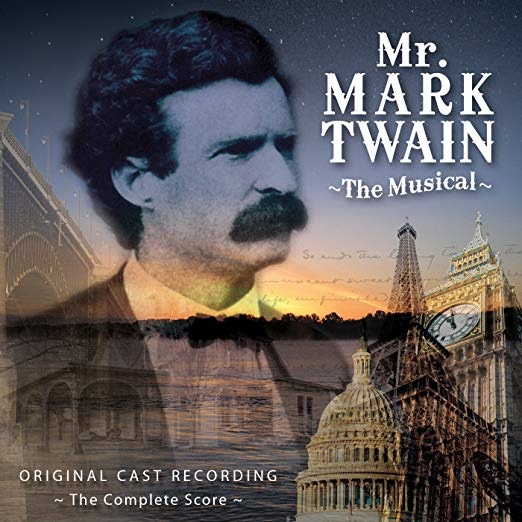
Wikipedia
Mr. Mark Twain: The Musical is a stage musical biography of Mark Twain that had a ten-year summertime run in Elmira, NY and Hartford, CT (1987-1995) and was telecast on a number of public television stations.[1][2] An original cast CD was released by Premier Recordings in 1988, and LML Music in 2009 issued a newly mastered and complete version of the score. Video and DVD versions of the show are currently in release.
The book was written by Jane Iredale with music and lyrics by William P. Perry. Dennis Rosa was the director and choreographer, and William David Brohn was musical arranger and music director. Throughout its run, the title role of Mark Twain was performed by William Perley and the primary singing role of "Jim" was played by Jack Waddell. The role of Olivia Langdon Clemens was played in the film version by Bernadette Wilson.
The musical was conceived on a massive scale with a cast of more than sixty, and the production designs by William Groom called for a forty-foot turntable and a Mississippi riverboat that rose to a vertical height of fifty-five feet. The performing venues were appropriately large: in Elmira a hockey arena under a geodesic dome and in Hartford the largest National Guard armory in New England. The musical has since been rewritten in reduced scale suitable for proscenium production and will shortly be available from Trobriand Music Company under the title "Mr. Mark Twain." In 2009, a complete original cast recording was released on CD by LML Music.
The musical combines scenes from Mark Twain's life with production numbers based on his best-loved books including
"The Adventures of Tom Sawyer", "Life on the Mississippi", "The Innocents Abroad", "Adventures of Huckleberry Finn", and "A Connecticut Yankee in King Arthur's Court."
In 1989, William Perry went to Moscow and selected twenty-four dancers from the Bolshoi Ballet and other prestige Russian dance companies and brought them to America to appear in the production, the first occasion that Russian performers had become integrated members of an American cast rather than simply appearing as a touring national troupe. This was a remarkable event during Cold War years, and then Russian President Mikhail Gorbachev saluted the collaboration in a television address. Dancers from Russia, including children, appeared in all subsequent years of the run and became a highlight of the production.
Musical Numbers can be obtained on the original cast recording Mr. Mark Twain the Musical:
Amazon
Act I
Prelude
We're Goin' Fishin'
A Pilot on the Mississippi
Welcome to Paris
The Can-Can
Roughing It
The Skating Madrigal
I Know There's a Place
The House on the Hill
Act II
The Camelot Rag
Russian Dance
When Out on the River
Let's Give the Folks a Taste of Royalty
Swing Low, Sweet Chariot
Men of Oxford
Finale: I Know There's a Place; Homeward Bound
Plot Synopsis
Act One
Mark Twain in his mid-30's arrives at Quarry Farm, his summer home in Elmira, New York. He greets the audience and begins to recount how he came to be in Elmira, far from his Missouri beginnings. As he talks about the past, two characters from his book, The Adventures of Tom Sawyer, appear—Aunt Polly leading the very same Tom Sawyer by the ear.
Twain admits to a certain similarity between himself and the recalcitrant Tom. He watches with amusement as Tom, doomed to white-washing Aunt Polly's fence, inveigles his pals into performing the task for him. They have entered, teasing Tom with the song, We're Goin' Fishin', and they exit with a victorious Tom singing along with them.
Twain explains that his joyous boyhood was over when his father died and he had to make a living. After a period as a printer's apprentice, he ran away to become a pilot on the Mississippi River. We see the young Mark Twain, known then as Samuel Langhorne Clemens, express his excitement at the prospect of his life on a steamboat as he sings A Pilot on the Mississippi.
The Civil War brought an abrupt end to Twain's career on the river, and for a brief period he joined the Confederate militia. But he soon headed West, propelled by fatigue brought on by "constant retreating" and his dislike of killing. It was here that he became a newspaper reporter and was sent by his paper, the Alta California, to cover the first American pleasure tour abroad. His arrival on French soil inspires the song, Welcome to Paris. Then he and his traveling companion, Charlie Langdon, are taken to the sensation of the day—a Paris nightclub where they watch and take part in The Can-Can.
While at the club, Charlie shows Twain a miniature portrait of his sister, Olivia, known as Livy. Twain immediately falls in love. On his return to America, he writes a hugely successful book about his travels which he calls The Innocents Abroad, and then he sets about courtship in earnest. Livy proves to be an elusive target. She resists his advances even though he regales her with stories of his past adventures, including his colorful years as a miner in the West. Even the boisterous singing and dancing of Roughing It fails to move her. But gradually she succumbs, and when we return to present time, Twain is married with three daughters and is blissfully happy.
He also has built a picturesque and expensive new home at Nook Farm[3] in Hartford, next door to Harriet Beecher Stowe. The house sits on a small hill below which is a pond which freezes over in the winter and inspires Twain to compose verses for The Skating Madrigal.
Much of Twain's life in Hartford is spent in socializing and entertaining. But in the summers, he concentrates on his writing at Quarry Farm, and one of his greatest joys is to gather his family in the evening on the porch and share with them the pages he has written during the day. On this evening, he reads them the first chapters of Adventures of Huckleberry Finn. The family is entranced as the scene literally comes alive in front of them. It ends with Jim and Huck floating off down the river on their raft while Jim sings of the freedom he knows will be his in I Know There's a Place.
But Twain's happiness disappears when his financial world is ruined by his own reckless investments, and he is forced to move his family abroad to save on expenses. He leaves his favorite daughter, Susy, behind so she can enter college. The Act closes with Susy wistfully waving her beloved family goodbye as she sings The House on the Hill, and their carriage pulls off.
Act Two
The Act opens with Twain and Livy in London at a performance of his A Connecticut Yankee in King Arthur's Court before Queen Victoria. After the singing and dancing of The Camelot Rag, the Queen admits that she has been really "quite amused", and Livy tells her husband that God is the only famous person he has yet to meet.
Their spirits are high though a telegram from the States arrives telling them that Susy had fallen ill. It is not thought to be serious, but suddenly the newsboys hawking their newspapers call out that "Mark Twain's daughter dies of spinal meningitis." The family is devastated. They long to return home, but Livy insists that they stay abroad until all their debts are paid. Twain reluctantly embarks on a world-wide lecture tour.
One of his stops involves Russia, where he is meets the Czar and is entertained by a folk troupe performing a Russian Dance.
At the age of sixty, now free of debt, he returns home a hero and internationally recognized as a man of letters. His love for Livy is as strong as ever, which he expresses in a tender scene with her when he recognizes the huge contribution she has made to his life. She asks what he is most proud of, and he tells her that it is Huckleberry Finn. As she moves into the house leaving him to reminisce, the raft bearing Jim and Huck reappears. Together they sing When Out on the River.
The peace of the Mississippi is soon shattered by the appearance of the King and the Duke who are escaping from irate townsfolk. Huck lets them take shelter on the raft but soon realizes that he has provided haven for a couple of scoundrels. Without further ado, in a riotous song entitled Let's Give the Folks a Taste of Royalty, they devise their plans for hoaxing the citizens of the next community they come to. Twain abandons his reverie as the King and the Duke are once again driven out of town.
Twain's thoughts return to Livy and her obviously failing health. Hoping that the warm climate of Italy might help her, he sets up house in Florence. But she is suffering from a heart disease. Fragile and exhausted, she dies in his arms. He remembers the first song he sang during their days of courtship, Swing Low, Sweet Chariot.
She is buried next to Susy in Woodlawn Cemetery in Elmira. Grief-stricken, Twain retreats to Quarry Farm. His comfort comes in the form of an invitation to go to Oxford University in England to be awarded the degree of Doctor of Letters. This long-cherished dream sends Twain off on his last overseas journey. Along with Auguste Rodin, Camille Saint-Saëns and Rudyard Kipling, Twain receives his honor as the graduation students sing Men of Oxford.
Twain steps off the podium and makes his way through the students who discard their gowns and reveal themselves as the characters from his books. One by one they greet him with the words he placed in their mouths. The final character is Jim who reprises I Know There's a Place. As the mists of time begin to swirl, Twain mounts the steps of Quarry Farm where Livy is waiting with outstretched arms. They go inside as the chorus sings Homeward Bound. The house slowly begins to turn, and a great Mississippi Riverboat swings into view. Twain is in the pilot house, home at last. In a rare observance of site specificity, the Elmira production took place only seven miles from Mark Twain's actual gravesite,[4] and the Hartford production was held just a mile and a half from Mark Twain's house, now a museum.[5]
Though Mark Twain is best known for his books, he also wrote several plays and in one instance composed a set of verses extolling his new home in Hartford. These were published in The Traveller's Record, January 1877 and form the basis for The Skating Madrigal in Act One of the musical.[6] In a case of life imitating subject, composer/lyricist William Perry achieved academic recognition when Elmira College awarded him the degree of Doctor of Letters (1984) for his production of the Mark Twain Series on PBS.[7]
• New York Times June 28, 1987 "An extravaganza of singing, acting and dancing"
• New York Daily News August 7, 1996 Review by Howard Kissel
• "Stowe's Hartford Neighborhood, Nook Farm". Harriet Beecher Stowe Center. Archived from the original on 2017-07-04.
• foxnews.com
• marktwinhouse.org Mark Twain's Home in Hartford
• The Traveller's Record January 1877
• Oswego Valley News William Perry Litt.D. addresses Elmira College graduates
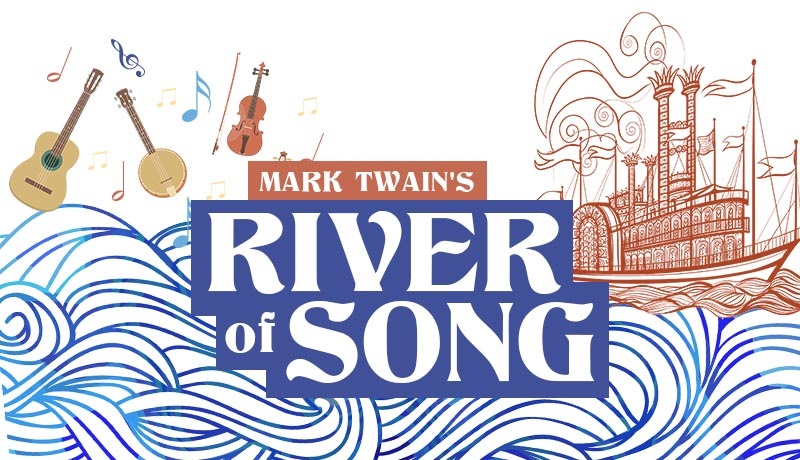
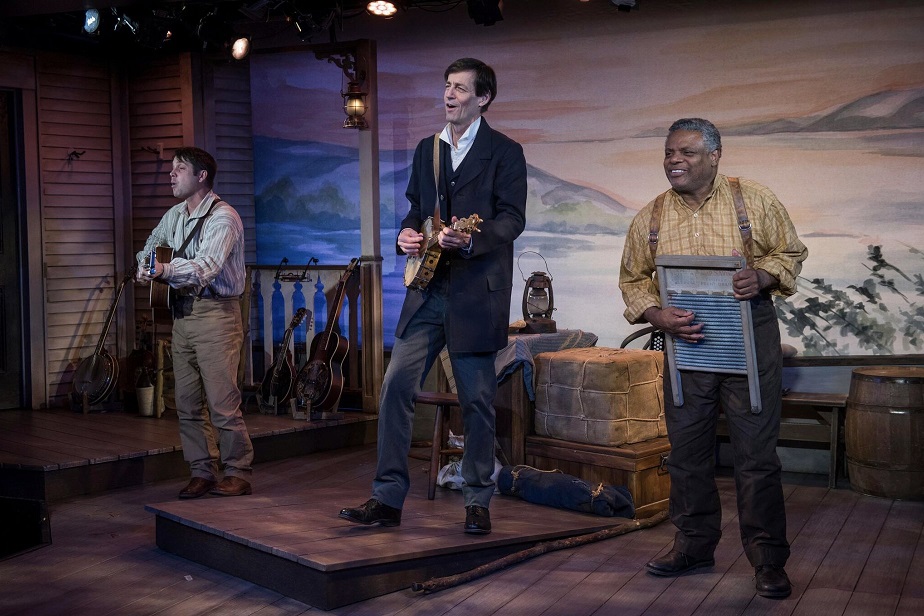
MARK TWAIN'S RIVER OF SONG
2 hours with one intermission
milwaukeerep.com
Milwaukee Repertory Theater
Patty & Jay Baker Theater Complex
108 East Wells Street
Milwaukee, WI 53202
From the creators of The Rep's hit production Back Home Again: On The Road With John Denver comes this exploration of the music and culture of America's first superhighway, the Mississippi River.
From the iron red water in Minnesota to the deep, dark Southern Delta, the river carries the stories and songs of the people. Come take a ride on the Mississippi—guided by the voices of the men and women who lived and worked on the river, tied together with the observations and insights of the Mississippi's most famous traveler, Mark Twain.
Performed by three world-class musicians, including David Lutken (Woody Sez, John Denver), it's a journey through America's Heartland and features traditional songs like "Dance Boatmen Dance," "Sometimes I Feel Like a Motherless Child," and "Deep River Blues."
"Mark Twain's River of Song" Video Preview | Milwaukee Rep
Youtube
Published on Jan 24, 2019
An exploration of the music and culture of America's first superhighway, the Mississippi River. Performances run now through March 17.
MARK TWAIN'S RIVER OF SONG Soothes & Inspires at the Milwaukee Repertory Theater
broadwayworld.com
by Kelsey Lawler
BroadwayWorld.com
January 25, 2019
Whitewashed towns, forests of green, golden fields. The snapshots of landscapes and life depicted in Mark Twain's River of Song are stitched together by the mighty Mississippi and woven in song. This world premier production by Randal Myler and Dan Wheetman features three fantastic entertainers bringing over 20 tunes from the days when riverboats ruled the The Big Muddy. Those songs tell the stories of farmers, lumberjacks, boat captains, gamblers, and runaways - their songs often optimistic, sometimes somber.
From the first chords they strum, the terrific trio of Harvy Blanks, David Lutken, and Spiff Wiegand plant smiles on faces and set toes a-tappin'. The three performers take turns on an impressive lineup of instruments: guitar, washboard, mandolin, fiddle, accordion - even a makeshift woodwind whiskey jug and a percussive tap-dancing little wooden man. Special nod to Wiegand, who is the real master of music-making; the range of instruments in his repertoire makes for lots of fun. While Wiegand brings a youthful, rollicksome energy, Harvy Blanks brings a jovial presence laced with subtlety and soul. His "Sometimes I Feel Like A Motherless Child" is easily the most stirring hymn of the bunch. In other moments, Blanks lights up so brightly, it's impossible not to beam right along with him.
For all the others' charms, David Lutken is the most rousing storyteller of the bunch. Honest and approachable, a natural friendliness shines through his performance. His comforting vocals and soothing cadance inspire cozy feelings of kinship.
Mark Twain's story of Huck and Old Jim was indeed the longest and meatiest of any of the tales Lutken told. Funny, but the titular character of Mark Twain's River of Song doesn't make an appearance until the latter half of Act Two. In the end, I found myself entranced, wishing Lutken would tell just one more story.
This wish for stories to last a little longer carried over to the music, too. I found there were some songs that, just as I began to fall for them, they were over. Though disappointing in the moment to say goodbye to melodies you've only just met, that's the sign of a something good. Leave the audience wanting more.
We actually did get a little more when technical difficulties wreaked havoc in the Stackner Cabaret on opening night. The troupe improvised through a 10-15-minute mic malfunction and played on, filling the space with music and laughter - a testament to not only their talents but to their sticktoitiveness and regard for this work, its creators, and the audience.
It was a treat to spend a couple hours rolling down the river for Mark Twain's River of Song. In a frigid Wisconsin winter, it's nice to take a little journey to the south, accompanied by songs and stories both moving and merry - but mostly merry. There's a wonderful sense of freedom in enjoying a musical theater performance that seems uncomplicated in its mission to lift spirits and bring folks together for a good time.
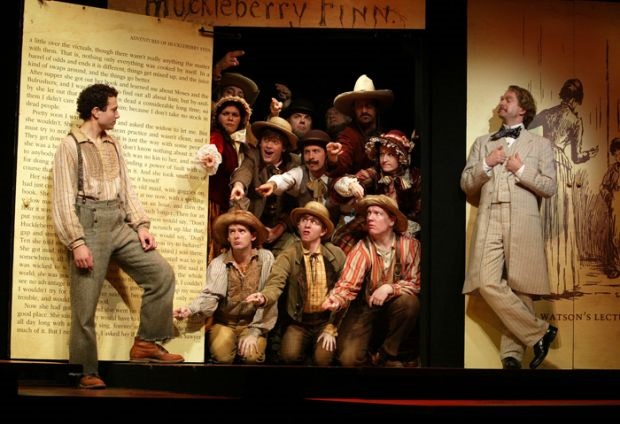
STAGE: WITH HUCK FINN ON THE 'BIG RIVER'
By FRANK RICH
APRIL 26, 1985 NEW YORK TIMES
nytimes.com
''BIG RIVER: THE ADVENTURES OF HUCKLEBERRY FINN'' is the last Broadway musical of the season - but, more important, it is the first that audiences can attend without fear of suffering either profound embarrassment or terminal boredom. This show has a lot going for it: a tuneful score by the country-music songsmith Roger Miller, exuberant performers and a gifted young director, Des McAnuff, who is full of clever ideas about how to bring Mark Twain's masterpiece to the stage.
If all of ''Big River'' were up to its high-water marks, the season might even have found the exciting new musical it desperately craves: The raw ingredients for such an achievement are on display at the Eugene O'Neill. But there are too many times, especially in the second act, when the imaginative flow of ''Big River'' slows to a trickle, and the show loses its promising way. While young theatergoers may well enjoy the entire bustling enterprise, adults can't be faulted for finding the evening a mixture of the modestly engaging and the tolerably bland.
At its best, ''Big River'' is much more faithful to its source than one might expect. The musical's creators understand that Twain's bottomless novel, in which a river journey limns the dark soul of a nation, is not merely a boy's adventure tale. When Huck and Jim board their raft to a rousing song called ''Muddy Water,'' Mr. McAnuff and his designer, Heidi Landesman, magically convey the characters' exhilaration at fleeing home; the moonlit river rises up on stage like a silver ribbon, tugging the audience and heroes alike into a mysterious, uncharted wilderness of the American spirit. In the similarly impressive opening scene, the whole social fabric of Twain's Missouri unfurls before us: As genteel townsfolk, browbeaten slaves and boisterous boys spill across the stage and into the auditorium, we see both the idyllic pleasures and unacknowledged injustices of the civilization from which Huck (Daniel H. Jenkins) and Jim (Ron Richardson) must escape.
If the makers of ''Big River'' can send us floating dreamily down the Mississippi or can summon up a vanished 19th-century world in a flash, it should be simple for them to accomplish such relatively easy tasks as telling the novel's plot, repeating its jokes and dramatizing its resonant love story between an outcast boy and a runaway slave. But, as it happens, ''Big River'' does the hard things well and the easy things sloppily. William Hauptman's script is as formulaic as Mr. McAnuff's staging is daring. Even as the production promises us the visionary sweep of Twain, the libretto provides a lengthy but comic-book-style digest of the novel that flattens out an American ''Ulysses'' into ''The Hardy Boys.''
Mr. Hauptman has made several dubious decisions. He attempts to include too many of the novel's anecdotes and, in so doing, must often truncate or rush them to the point where their comic payoff (and, at times, narrative thrust) is lost. Yet the few incidents he does leave out - the Grangerford-Shepherdson feud, the vigilante lynching - are precisely those that are most essential to preserving the novel's bite. Worse, the libretto is so haphazardly structured that Jim and Huck sometimes seem to disappear: By the Act I finale, the show has shifted its focus away from its heroes to center instead on those vagrant con men, the Duke (Rene Auberjonois) and the King (Bob Gunton). Once that happens, not even a climactic Act II embrace can recharge the tidal thematic and emotional pull of the Huck-Jim bond.
The music and lyrics, often riding on giddy banjo-and-fiddle-flecked hoedown arrangements, at first rise well above the text. Mr. Miller writes in indigenous Southern and Western American idioms that are ideally expressive of Twain's characters and their salty vernacular. Act I contains one lively song after another, including a talking-blues diatribe against ''Guv'ment'' (flintily delivered by John Goodman as Pap Finn), a sweet spiritual for anonymous slaves and a haunting anthem (''River in the Rain'') in which Huck and Jim apotheosize the wonders of the mythic Mississippi.
But once the book bogs down irrevocably in Act II, Mr. Miller turns to cliches. Some irrelevant and arbitrarily inserted numbers, notably a puppy-love ballad for Huck and a passing female acquaintance (Patti Cohenour), seem to have been written for the pop charts rather than ''Big River.'' When Huck and Jim sing of how they are ''worlds apart'' or when Jim delivers a canned paean to freedom (''I wish I could spread my wings and fly!''), we've left Twain country behind for platitudinous musical-comedy land.
By Act II, even Miss Landesman's wondrous set, which conjures up both sunlit settlements and foggy nights downriver, runs out of surprises. But the cast by and large remains endearing. The powerful-voiced Mr. Richardson makes for a majestic Jim - although the slave is timidly and anachronistically bowdlerized here as an incipient 20th-century civil-rights activist. Mr. Auberjonois, looking like a Dr. Seuss drawing, and Mr. Gunton, resembling a dyspeptic Gabby Hayes, bring a devilish edge to their bunkum artists - most delightfully so when they perform their hammy burlesque renditions of Shakespeare for Arkansas rubes. There are also spiky cameo contributions from Carol Dennis, Jennifer Leigh Warren, Gordon Connell, William Youmans and, most crucially, John Short as a brash and cunning Tom Sawyer.
Mr. Jenkins's Huck is more problematic. While the performer has a nice voice and the right twang, he is too old to play a boy in his early teens - and too domesticated to convey a corrosive, conscience-stricken outsider who would rather light out for territory than be ''sivilized.'' But he's always charming company and, in that sense, he's the perfect Huck Finn for an ingratiating musical that can't quite bring itself to raise hell. Rolling Along BIG RIVER, music and lyrics by Roger Miller; book by William Hauptman; staged by Des McAnuff; scenery by Heidi Landesman; costumes by Patricia McGourty; lighting by Richard Riddell; orchestrations, Steven Margoshes and Danny Troob; dance and incidental music, John Richard Lewis; musical direction and vocal arrangements, Linda Twine; choreography by Janet Watson; stage movement by B. H. Barry. Presented by Rocco Landesman, Heidi Landesman, Rick Steiner, M. Anthony Fisher and Dodger Productions. At the Eugene O'Neill Theater, 230 West 49th Street. WITH: Rene Auberjonois, Evalyn Baron, Reathel Bean, Michael Brian, Susan Browning, Ralph Byers, Patti Cohenour, Gordon Connell, Carol Dennis, Aramis Estevez, John Goodman, Bob Gunton, Peggy Harmon, Andi Henig, Elmore James, Daniel H. Jenkins, Franz Jones, Ron Richardson, John Short, Jennifer Leigh Warren and William Youmans.
VARIETY REVIEW OF 2001 REVIVAL:
Deaf West Theatre
production
of Big River
By JULIO MARTINEZ
VARIETY
30 OCTOBER 2001
With: Mark Twain - Bill O'Brien
Huck Finn - Tyrone Giordano
Jim - James Black
Tom Sawyer - Michael Davis
Mary Jane Wilkes - Malissa van der Schyff
King - Lyle Kanouse
Duke - Allen Neece
Papp Finn - Troy Kotsur
Widow Douglas - Mary Jo Catlett
Slave/Alice - Pam Trotter
Judge Thatcher - Olav Axelsen
JOHN RUBENSTEIN SPEAKS AND "SIGNS" A HEARTFELT INTRODUCTION TO A MONTAGE FROM DEAF WEST'S BIG RIVER
[CC] Deaf West's Big River: 2004 Tony Awards
Andy Mientus & Michael Arden
Youtube Published on Jun 6, 2016
SUBSCRIBE 970
Deaf West's Big
River's look-back from the 2004 Tony Awards. Featuring Hugh Jackman who introduces John Rubenstein, who then introduces the Big River montage. Cast members include Spring Awakening's Tony nominated director Michael Arden, Tyrone Giordano, Dan Jenkins, Scott Barnhardt, Catherine Brunell, Walter Charles, David Aron Damane, Christina Ellison Dunams, Gina Ferrall, Phyllis Frelich, Lyle Kanouse, Rod Keller, Troy Kotsur, Kevin Massey, George McDaniel, Michael McElroy, Drew McVety, Guthrie Nutter, Ryan Schlect, Iosif Schneideman, Gwen Stewart, Melissa Van Der Schyff and Alexandria Wailes.
Helmer Jeff Calhoun has accomplished a near-seamless interplay of speaking and signing performers in Deaf West's staging of "Big River," the ambitious 1985 Tony Award-winning adaptation of Mark Twain's "Huckleberry Finn." Tony-winner Calhoun, who directed last year's award-winning staging of Lionel Bart's "Oliver!," has again used the book's author (Twain instead of Dickens) to serve as narrator, the original text facilitating the continuity of the storyline, and the results are even more rewarding. Enhancing Calhoun's efforts are the creative set panels of Ray Klausen and the period-perfect four-piece instrumental ensemble under the direction of keyboardist Steven Landau.
Led by Bill O'Brien's (recurring on "West Wing") effectively twangy outing as Twain and his country-rich vocal turn as the voice of Huck Finn (signed by Tyrone Giordano), this Deaf West production does great justice to Roger Miller's score.
Set in the 1840s, the plot focuses on Huck Finn's efforts to help Jim (James Black), escape to the North. Of course, his adventures are populated with all the classic characters from the novel: the scampish Tom Sawyer (Michael Davis), Huck's ne'er-do-well father Papp Finn (Troy Kotsur), roguish con men Duke (Allen Neece) and King (Lyle Kanouse), the Widow Douglas (Mary Jo Catlett), Judge Thatcher (Olav Axelsen) and Huck's first love, Mary Jane Wilkes (Melissa van der Schyff). Almost upstaging the performances are Klausen's magnificent panels that magically convert from giant reproductions of the illustrated pages of Twain's novel to the production's many settings.
O'Brien (who also produces) achieves a winning presence as a youngish Twain moving in and out of the ensemble as he takes on the speaking/singing duties for Giordano's endearing Huck. O'Brien sets the tone for Huck's innate wanderlust with his heartfelt, "I'm Waiting for the Light to Shine."
Though his speaking voice is occasionally too understated and undervolumed, Black exudes a striking presence and a sense of humble urgency as the slave attempting to gain his freedom on the Mississippi River.
His singing voice also lacks the range and power necessary to really sell the river anthem, "Muddy Water," but he is quite effective in his softer duets with O'Brien.
One of the joys of Calhoun's staging is his inventive use of signing and speaking actors who are portraying the same role. The comical highlight of the first act is Papp Finn's ornery rendition of "You Dad Gum Government," signed and sung with synergistic glee by Troy Kotsur and Lyle Kanouse, respectively. The same rapport is established by Davis' Tom Sawyer and his irrepressible signing rendition of "We Are the Boys," aided admirably by the voice of Rod Keller.
The costumes of David Zyla and the lights of Michael Gilliam do much to underscore the high level of professionalism Deaf West Theater has attained over the past few years.
Big River
Deaf West Theater
North Hollywood
99 seats
PRODUCTION: A Deaf West Theater presentation of a musical drama in two acts, with book by William Hauptman (adapted from the novel by Mark Twain), music and lyrics by Roger Miller. Directed by Jeff Calhoun.
CREATIVE:
Choreography, Calhoun; musical direction/keyboard, Steven Landau; sets, Ray Klausen; lights, Michael Gilliam; costumes, David R. Zyla. Opened Oct. 27, 2001; reviewed Oct. 28; closes Dec. 16. Running time: 2 HOURS, 30 MIN.
CAST: Mark Twain - Bill O'Brien
Huck Finn - Tyrone Giordano
Jim - James Black
Tom Sawyer - Michael Davis
Mary Jane Wilkes - Malissa van der Schyff
King - Lyle Kanouse
Duke - Allen Neece
Papp Finn - Troy Kotsur
Widow Douglas - Mary Jo Catlett
Slave/Alice - Pam Trotter
Judge Thatcher - Olav Axelsen
Ensemble: Michelle Banks, Michael Criste, Rod Keller, William C. Martinez II, Megg Masterjohn, Ryan Schlect.
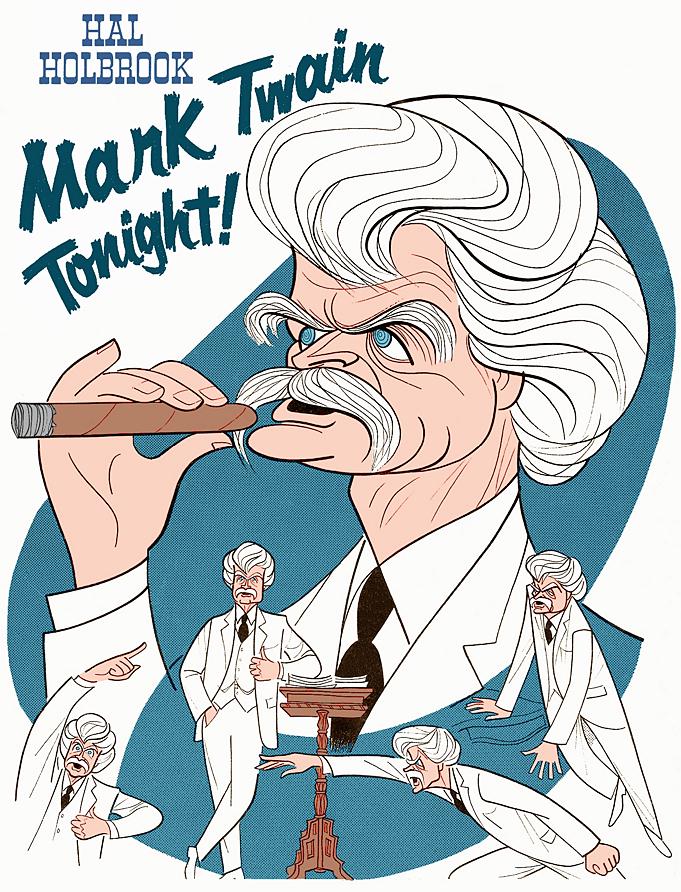
Hal Holbrook as Mark Twain becomes Huck Finn Part-1
Youtube
paxgnbru
Published on Oct 9, 2010
Hal Holbrook as Mark Twain becomes Huck Finn Part-2
Youtube Published on Oct 9, 2010
Broadway Review
MARK TWAIN TONIGHT!
Theatre Review by Matthew Murray
June 9, 2005
Hal Holbrook in Mark Twain Tonight!
talkinbroadway.com
Brooks Atkinson Theatre, 256 West 47th Street
Limited engagement through June 26 Monday through Saturday at 8 PM.
Sunday Matinee at 3 PM.
If smoke could be taught to dance, only Hal Holbrook could provide the choreography. When it emerges from the cigar he puffs on throughout Mark Twain Tonight!, it seems the closest thing to a representation of us on the stage of the Brooks Atkinson. As Holbrook manipulates the wisps of smoke that swirl around him and then vanish into the fly space, so is the audience nothing but his willing plaything. In the game of theatre, who could ask for anything more?
It's refreshing that, after over five decades of plying the Samuel Clemens trade, Holbrook hasn't lost his grip on the soul of the iconic American author and humorist. Decked out in an ivory-colored suit, and with the unkempt hair and mustache that are Twain trademarks, Holbrook looks the part from the instant he appears onstage. As he slowly unfurls the show, revealing by turns the mischievous and serious sides of Twain, he demonstrates something more: He still possesses the personality, wit, and good taste that have helped make this show (which he assembled and directed) so enduringly popular.
Beyond that, Holbrook proves that, 95 years after his death, Twain remains a common-sense voice in a troubled world. For Twain's writing was, intentionally or otherwise, for the ages, expressing in the unique cadence of its Missouri-born-and-bred creator an unmistakably American sensibility that, in its brash optimism and stinging observational power, resonates strongly today. If some of Twain's comments buck recent trends toward what we might term political correctness (including a number of particularly pointed - if still funny - barbs aimed at France), they're connected by Twain's underlying love his country and fellow man, qualities he sees violated far too often.
But his despair at those violations permeates - and centers - this production, or at least it did at the press performance I attended. I can't guarantee you'll see exactly (or even mostly) what I saw - Holbrook is continually refocusing the show and drawing anew from a selection of over 70 pieces of Twain's writing, making the shape of the evening different every night and utterly dependent on audiences and his relationship with them. However, so masterfully assembled was the collection of witticisms, anecdotes, and pieces of sage advice at the performance I attended that it seemed as if it had been planned long in advance.
For the two-hour show seemed structured as a commentary on the politically divided state of America today. In addition to his token wry observations about the government and the type of people it attracts ("First God made idiots; that was for practice. Then he made Congress."), he warned about the dangers of an unchecked media, the volatility of colliding concepts of religion (most notably in a brief, eerily pertinent piece about disagreements between a Christian and a Muslim), and the vital role perspective - and willingness to rethink it - plays in discourse. "Loyalty to petrified opinion never broke a chain or freed a soul," he said, "and never will."
Holbrook delivered that line as if it were the simplest, most straightforward sentiment ever expressed. When stated so plainly and so simply, such ideas seem at their most powerful: The audience never failed to fall to utter silence during Twain's more impassioned speeches, or applaud a stinging rebuke of one political party. (Which, it must be noted, was invariably followed immediately by a similar comment about the other party.) Ordinary language, without embellishment, really can be the best way to communicate.
That ability to cut through artifice - whether of human nature or of theatre - is what most directly connects Holbrook with Twain. That, in concert with the good-natured attitude of both performer and subject, helps smooth over the production's rougher patches: Holbrook, now 80 (playing Twain at 70), occasionally steadies himself by holding onto a set piece, and loses a bit of his authority; he sometimes refers to what look like hand-written notes; and poorly implemented amplification muffles or distorts outright many of his more intricate turns of phrase. (Richard Costabile is the production supervisor.)
Ultimately, however, these concerns don't diminish the thrill of seeing this great American actor embody a great American in the highly theatrical and enjoyable way he made famous. The show runs only through June 26, and it's not exactly imprudent to consider how many more chances you might have to see Holbrook perform the show. Time for him, as for all of us, marches on.
Twain, of course, considered this, too; and it was clearly on Holbrook's mind as well. "I wonder if a person ever ceases to feel young," he asked, only half to himself, as the performance I attended drew to a close. It's a question well worth pondering, but the answer is likely already in evidence: Mark Twain Tonight! doubtlessly, on some level, keeps Holbrook young. The effect of his joyous, evocative performance on the audience would not seem all dissimilar.
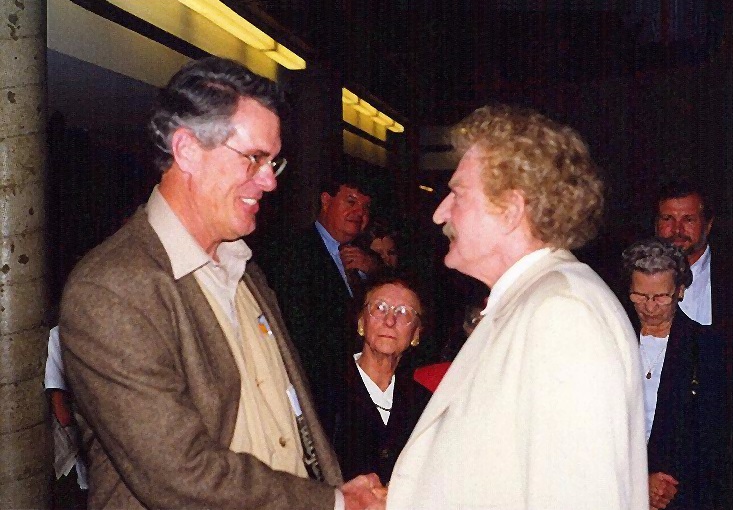
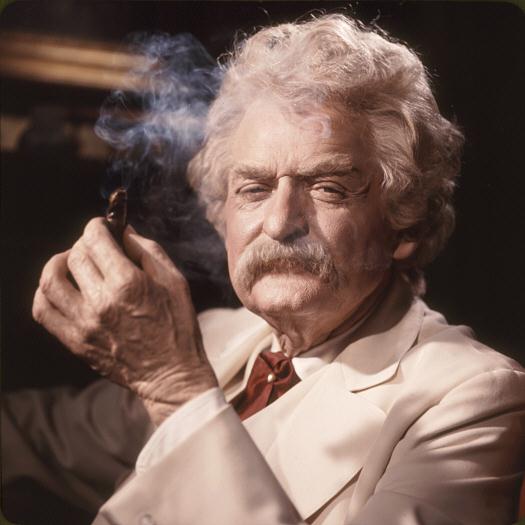
In the late 1990's I went to St. Louis with a bus load of folks from Hannibal to attend Hal Holbrook performing in his MARK TWAIN TONIGHT! one man show at Edison Theatre on the Danforth Campus of Washington University in Mallinckrodt Center on the north side of Forsyth Boulevard off Wallace Drive.
After the show Holbrook met with the Hannibal contingent. AS we were shaking hands Hal never let go of mine while we talked for what seemed to me quite a while about all kinds of subjects including the animated film CATS DON'T DANCE that both of us recorded voices for. I was a bit self conscious during our talk because as you can see there were quite a few Hannibal folks waiting to talk to Holbrook and I was the only non-Hannibalian in the group. Henry Sweets of the Mark Twain Museum in Hannibal took the photograph.

With the exception of images credited to public institutions,
everything on this page is from a private collection.
Please contact Steamboats.com for permission for commercial use.*
All captions provided by Dave Thomson, Steamboats.com primary contributor and historian.
